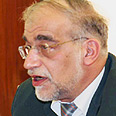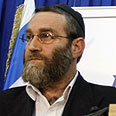
David Rotem
Photo: Gil Yohanan

Moshe Gafni
Photo: Dudi Vaaknin
The Knesset's Constitution, Law and Justice Committee debated amendments to the conversion bill Wednesday, ahead of its first reading in the coming weeks.
Knesset Member Moshe Gafni (United Torah Judaism), who heads the committee, said he found "no unbridgeable gaps" in the proposed bill, adding that despite none of its articles violating the Halacha, he would still like to make "some technical changes," which may thwart future problems.
Law & Order
Kobi Nahshoni
Knesset approves, in preliminary reading, Yisrael Beiteinu's conversion bill, which allows local rabbis to perform conversions, aims to minimize conversion annulment
The main purpose of the bill is to facilitate the conversion of thousands of non-Jewish immigrants living in Israel. Rotem also proposed that once a conversion is recognized by the state, no religious body would have the right to overturn it.
The bill was fiercely opposed by the haredi factions in the past, with United Torah Judaism going as far as boycotting its preliminary reading, despite being bound by the coalition agreement.
"This is a good bill and its biggest plus is that it cements the position of the Chief Rabbinate as the conversions authority," said Gafni.
The bill, he added, will also thwart the Reform movement's standing High Court petition, demanding the State recognizes their conversions as well.
Nevertheless, Gafni said he will oppose any halachic mitigation in the conversion process.
Rotem, for his part, protested the establishment's constant scrutiny of converts. As for conversion annulments, he said that "It's unthinkable that the Jewishness of people who were recognized as a converts and have lived here as Jews for years would all of a sudden be questioned and annulled by some rabbinical court."















